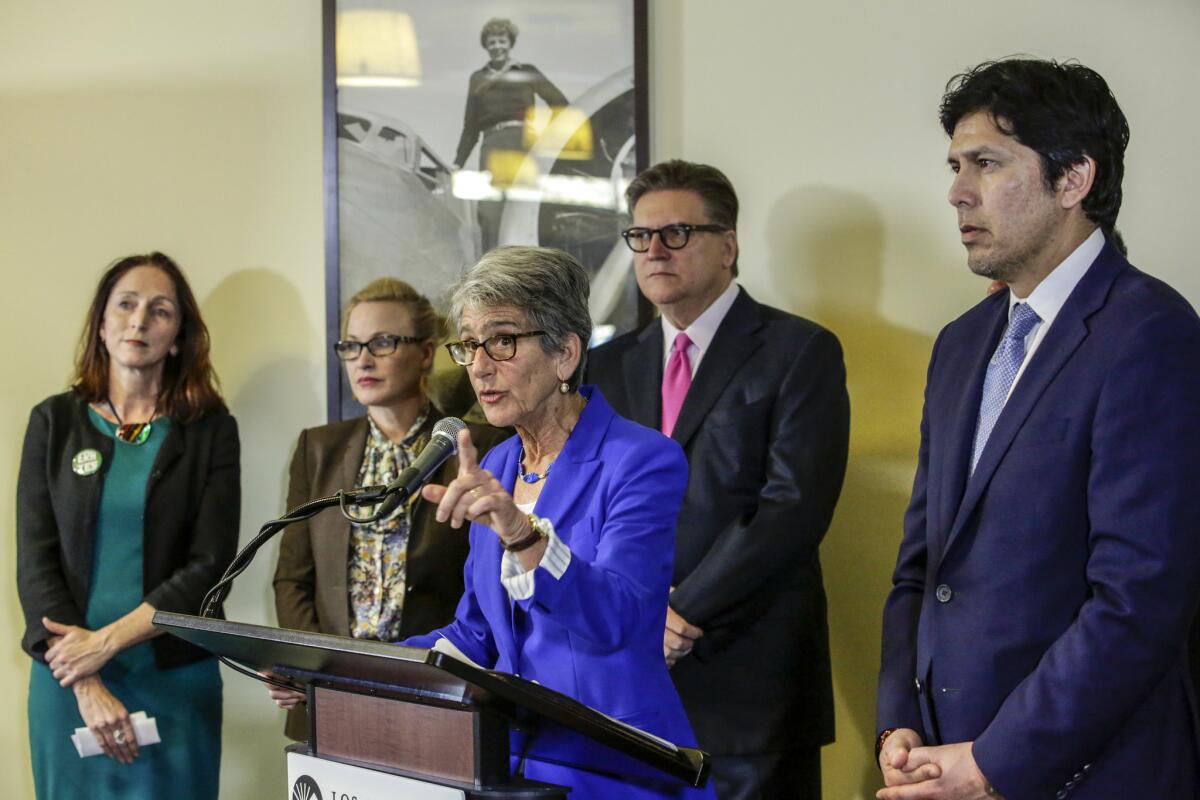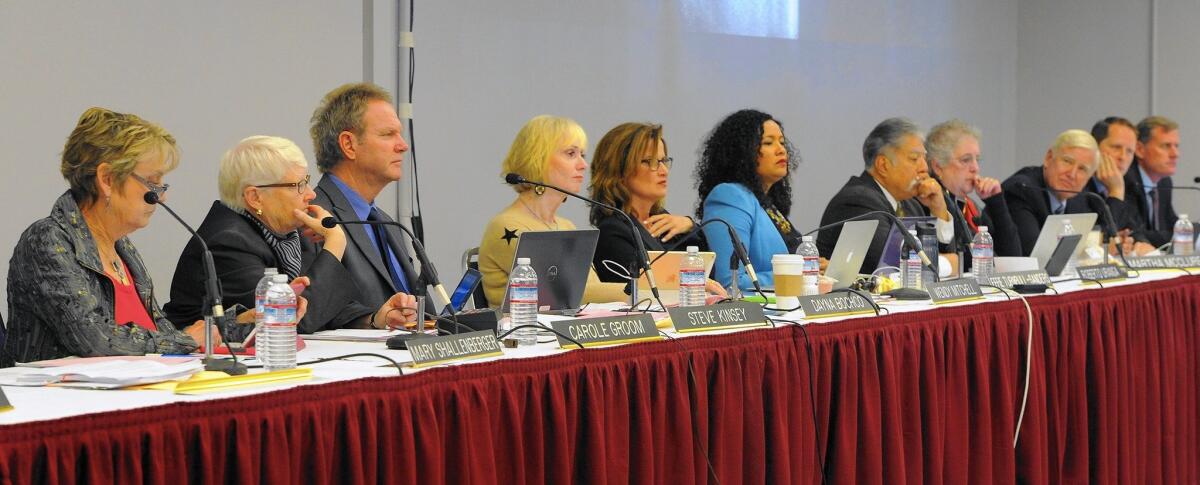State senator calls for a ban on private meetings with coastal commissioners to ‘level the playing field’

State Sen. Hannah-Beth Jackson, D-Santa Barbara, has introduced legislation to ban “ex-parte” communications with members of the California Coastal Commission.
- Share via
It’s become a familiar sight during the California Coastal Commission’s three-day meetings. Members of the powerful panel can be seen huddling with developers or their representatives in hallways, in the back of the hearing room or outside during breaks.
At other times, commissioners have discussed pending business over dinner, on the telephone, via email, in offices and during site visits of proposed projects.
The so-called ex-parte communications between individual commissioners and developers, lobbyists, environmentalists and other interested parties have become a major element in the way the commission presides over land use, public access and environment protection along 1,100 miles of coastline.
Some commissioners say they have become dependent on the contacts for information that helps them make decisions. Despite complaints by critics, they say the communications are not chiefly vehicles for development interests to gain an advantage.
A Times review of disclosure forms that commissioners must file to record every ex-parte contact, however, shows that the heaviest users by far are development interests that can be affected financially by commission denials of construction permits or approvals that scale down projects and impose costly requirements for environmental protection and public access.
Of 374 ex-parte disclosure forms filed from January 2015 to March 2016, more than half involved developers, property owners and their lobbyists. Environmental groups accounted for less than 10% of the total.
Now, a Democratic state senator from Santa Barbara has introduced legislation to ban those communications — a move that has raised questions about who gets access to individual commissioners and the fairness of the commission’s quasi-judicial process that weighs both sides before rendering a decision.
“This bill will level the playing field between big-moneyed interests and those without such financial resources,” said Sen. Hannah-Beth Jackson. “It will remove the possibility of backroom decision-making or the perception that it’s occurring and will help ensure that decisions are made more openly and transparently.”

Some members of the California Coastal Commission at a hearing at the Santa Monica Civic Auditorium.
Jackson contends the measure is needed to restore public confidence in the commission after the panel fired Executive Director Charles Lester in February with little public explanation despite overwhelming opposition to his termination.
Ralph Faust, the agency’s general counsel from 1986 to 2006, agrees, saying the current system is inherently unfair and favors those who hire expensive consultants to lobby commissioners privately.
“Not everybody can wine and dine at the same level,” Faust said. “If you are an amateur, if you are an innocent, you are toast. I have watched this process evolve over the years. I’ve watched it from the inside. I’ve engaged in ex-parte communications. I’ve had commissioners tell me they don’t take seriously someone who doesn’t call them ahead of time.”
Ex-parte communications are private verbal or written communications between a commissioner and an interested party that could influence a decision.
After 1992, commissioners were required within seven days of an ex-parte to disclose the contact on a form that contains the date, place, participants and a summary of the discussion. If the communication occurs fewer than seven days before a commission meeting, it must be revealed orally at the public hearing.
Commissioners who fail to report an ex-parte are prohibited from voting on the matter that was discussed nor can they try to influence the commission’s decision. Violations of the disclosure requirements also carry fines of up to $7,500, and commission decisions affected by a violation can be revoked.
Those with an interest in commission matters typically include lobbyists, developers, property owners, corporate representatives, government officials, community leaders and environmentalists.
Of the disclosure forms reviewed by The Times, two lobbyists who often represent development interests accounted for 160 ex-parte communications or 42% of the total. Susan McCabe and her associates had the most with 114. Forty-six involved David Neish and David Neish Jr.
The rest of the ex-partes were with local government officials, concerned citizens, neighborhood groups, church representatives, school officials and animal-rights groups.
The review also found some sloppiness in the preparation of disclosure forms by commissioners. Nine were filed late while half a dozen lacked dates and signatures.
About two dozen forms were filled out by lobbyists and given to commissioners to sign and turn in. Each contained identical language, although the ex-partes took place on different dates and involved different commissioners.
Three forms prepared by lobbyists and signed by different commissioners contained the same spelling error of therefore. It was spelled “therefor.”
Some commission members and private consultants who lobby the agency say ex-parte communications ensure fair hearings by helping commissioners better understand projects and letting people with differing views be heard.
They and other supporters of ex-partes, including real estate, business and agricultural interests statewide, argue that Jackson’s bill would discourage public participation, dry up sources of information and harm the decision-making process.
“More communication is better than less,” said Wendy Mitchell, a coastal commissioner since 2011. “Everyone should have access to the commission.”
They do what lobbyists do.... The public can never compete with a professional lobbyist.
— Sara Wan, environmental activist
Ex-partes also allow commissioners to clear up questions about a project and gather information that might not become available during monthly commission meetings when time is often limited for presentations.
Stanley Lamport, an attorney who represents clients before the commission, said it can be very difficult to air all the issues fully in the 15 or 20 minutes developers might get to present their projects to the commission.
Ex-partes “are necessary unless you want to make the hearings longer,” Lamport said. “Pretend you are a busy commissioner. You get the staff reports, review thousands of pages and try to understand them in a couple of weeks. It’s hard to assimilate all the information. It’s a ton of information and involves material that is not reducible to a sound bite.”
McCabe, a lobbyist who is one of the most prolific users of ex-parte communications, said she has no greater access to the panel than other developers’ agents, environmentalists, property owners or the public.
“I think the rules are transparent and it affords anyone, on any side of an issue, an opportunity to have communication with the commissioners,” McCabe said.
Asked about the disclosure forms drafted by lobbyists and consultants, Lamport said he has written them for some commissioners to make sure they are filled out correctly to avoid jeopardizing project approvals. McCabe said she prepares the forms when asked and returns them to commissioners, who can decide whether they are complete.
Critics of ex-parte communications contend, however, that the private nature of the one-way discussions could introduce bias into the commission’s decision-making process, which is much like a court proceeding.
“Ex-partes clearly do not strike the people involved in coastal disputes as being a fair process in which only information brought out at public commission hearings should be considered,” said Michael Asimow, a professor emeritus at UCLA Law School and an expert in California administrative law.
While serving on the Coastal Commission from 1996 to 2011, Sara Wan, a longtime Malibu resident and environmental activist, said she objected to ex-partes, but conducted them because other commissioners did them. Wan added that she made herself accessible to all sides.
By allowing ex-partes, “you encourage lobbyists to develop relationships with commissioners,” she said. “They are there every month. They meet with them. They go places with them. They do what lobbyists do.... The public can never compete with a professional lobbyist.”
Wan, a supporter of Jackson’s bill, dismissed the disclosure forms as having little value, noting that some are filled out by lobbyists before they are signed and submitted by commissioners.
Faust, the former general counsel for the commission, also said the forms rarely reflect what really happens during the private meetings with project applicants and their representatives.
Similarly, the state attorney general’s office told the agency’s executive director in June 2014 that commissioners might neglect to make disclosures in the required form.
All ex-partes really accomplish, Faust said, is to deepen the public’s suspicions that deals are being cut in secret. “Many people think as Lenny Bruce used to say: ‘In the halls of justice, all of the justice is in the halls,’” he added.
Ultimately, the critics of ex-partes want to eliminate them and require the commission to conduct all its business in public. Much is at stake, they say.
“People are fighting about the last scraps of the coast that are still open for development,” Faust said. “A lot of what we’re talking about is who gets to use it, and how. And what gets protected, and how we protect it. In the end, the decisions we make will have a huge impact on what our children and grandchildren, and so on, get to see and experience.”
Twitter: @LADeadline16
Twitter: @kchristensenLAT
More to Read
Sign up for Essential California
The most important California stories and recommendations in your inbox every morning.
You may occasionally receive promotional content from the Los Angeles Times.












